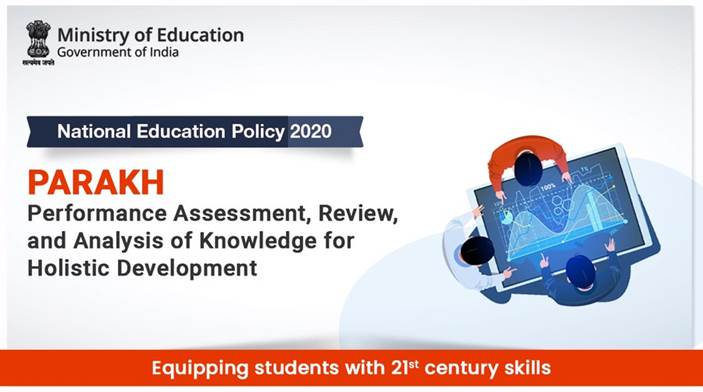Description

Copyright infringement not intended
In News
- According to unofficial sources, 3 global educational non-profits institutions: Educational Testing Services (ETS), American Institutes for Research (AIR) and the Australian Council for Educational Research (ACER) have expressed interest to help in setting up India’s first national school-level examination and assessment regulator.
- Educational Testing Services (ETS) is internationally recognised for conducting Tests on English as a Foreign Language.
- American Institutes for Research (AIR) and the Australian Council for Educational Research (ACER) are leading names in research on behavioural and social science domains and learning assessment studies.
Background
- Recently the Union government announced to release of a “benchmark framework” to evaluate students' performance at the secondary and higher secondary level.
- The main objective of the framework is to ensure “uniformity” across the state and central boards which presently follow different criteria for evaluation.
- The National Council of Educational Research and Training (NCERT) discussed the “common assessment framework” with the representatives of state boards and State Councils of Educational Research and Training (SCERTs).
- They suggested setting up a new assessment regulator ‘PARAKH’.
About PARAKH
- Performance Assessment, Review and Analysis of Knowledge for Holistic Development (PARAKH) would act as a division of the NCERT.
- The benchmark assessment framework will end the stress on rote learning.
- It will establish norms, standards and guidelines for assessment and evaluation for all recognized school boards in India.
- It will encourage and help school boards to develop their assessments programme to meet the skill requirements of the 21st century.
- It will carry periodic learning outcome tests like the National Achievement Survey (NAS) and State Achievement Surveys.
- The government is expecting that the National Achievement Survey (NAS) in 2024 will be conducted by PARAKH.
- It will guide the State Achievement Surveys and monitor the achievement of learning outcomes in the country.
- PARAKH, the proposed implementing agency, is also part of the National Education Policy (NEP) proposal.
Highlights of New Education Policy 2020
- The National Education Policy (NEP) 2020 was released in July 2020.
- NEP 2020 will replace the National Policy on Education, 1986.
- It aims at ensuring Universal Access at All Levels of schooling from pre-primary school to Grade 12.
- It Ensures quality early childhood care and education for all children between 3-6 years.
- It introduced a New Curricular and Pedagogical Structure (5+3+3+4).
- 5 years of foundational stage (for ages 3 to 8).
- 3 years of preparatory stage (for ages 8 to 11 or classes 3 to 5).
- 3 years of middle stage (for ages 11 to 14 or classes 6 to 8).
- 4 years of secondary stage (for ages 14 to 18 or classes 9 to 12).
- No strict separations between arts and sciences, between curricular and extracurricular activities, and between vocational and academic streams.
- To establish a National Mission on Foundational Literacy and Numeracy.
- Promoting multilingualism and Indian languages.
- Reform in Assessment of Board Exams. Setting up a new National Assessment Centre, PARAKH (Performance Assessment, Review, and Analysis of Knowledge for Holistic Development).
- Special priority is given to socially and Economically Disadvantaged Groups.
- A separate Gender Inclusion fund and Special Education Zones for disadvantaged regions and groups;
- A transparent process for recruitment of teachers and merit-based performance assessment.
- Ensuring availability of all resources through school complexes and clusters.
- Setting up of the State School Standards Authority.
- Promoting Vocational education in school and higher education systems.
- Increasing Gross Enrolment Ratio (GER) in higher education to 50%.
- Multidisciplinary Education with multiple entry/exit options.
- Establishment of Academic Bank of Credit
- Setting up of Multidisciplinary Education and Research Universities.
- Setting up of the National Research Foundation.
- Expansion of open and distance learning to increase GER.
- Teacher Education - 4-year integrated stage-specific, subject-specific Bachelor of Education
- All higher education institutions (HEIs) will be restructured into 3 categories:
- Research universities focus equally on research and teaching.
- Teaching universities focus primarily on teaching.
- Degree-granting colleges primarily focused on undergraduate teaching.
- Multiple mechanisms with checks and balances will combat and stop the commercialization of higher education.
- All education institutions will be held to similar standards of audit and disclosure as not-for-profit entities.
- The Centre and the States will work together to increase public investment in the Education sector to reach 6% of GDP at the earliest.
- Strengthening of the Central Advisory Board of Education to ensure coordination to bring overall focus on quality education.

Objectives of NEP 2020
- Reforms in curriculum content.
- The medium of instruction should be in the child's local language/mother tongue. The current three-language formula will continue to be implemented.
- Reform in the overall assessment process
- Teacher training and management.
- Ensure effective governance of schools.
- Increasing Gross Enrolment Ratio to 50% by 2035 (It was 26.3% in 2018).
- Restructuring of institutions.
- Multidisciplinary education.
- Improving research.
- Promoting Digital education.
https://indianexpress.com/article/education/ncert-proposal-for-parakh-global-bodies-express-interest-in-setting-up-school-exam-regulator-8239636/
https://t.me/+hJqMV1O0se03Njk9













